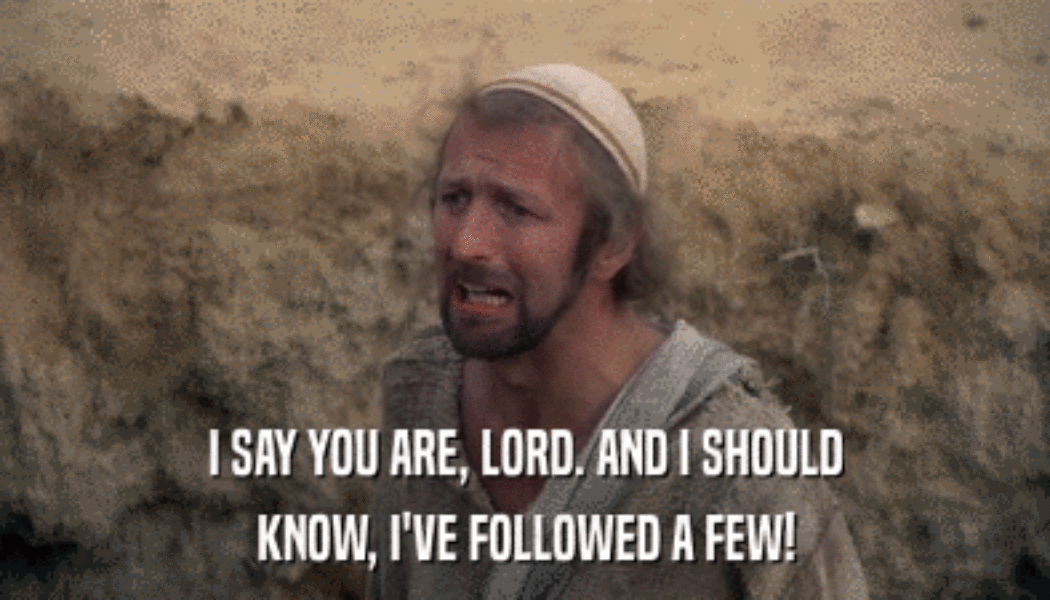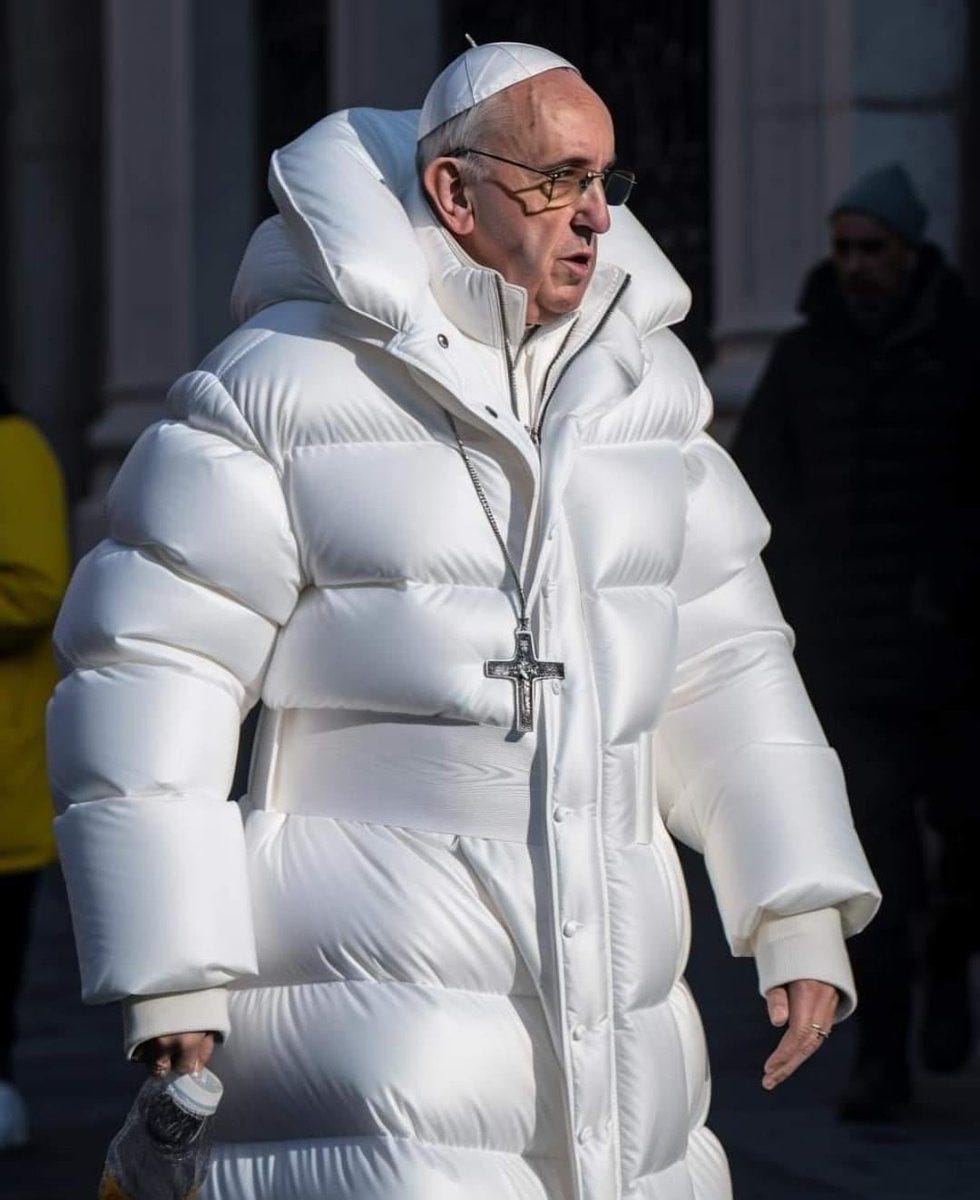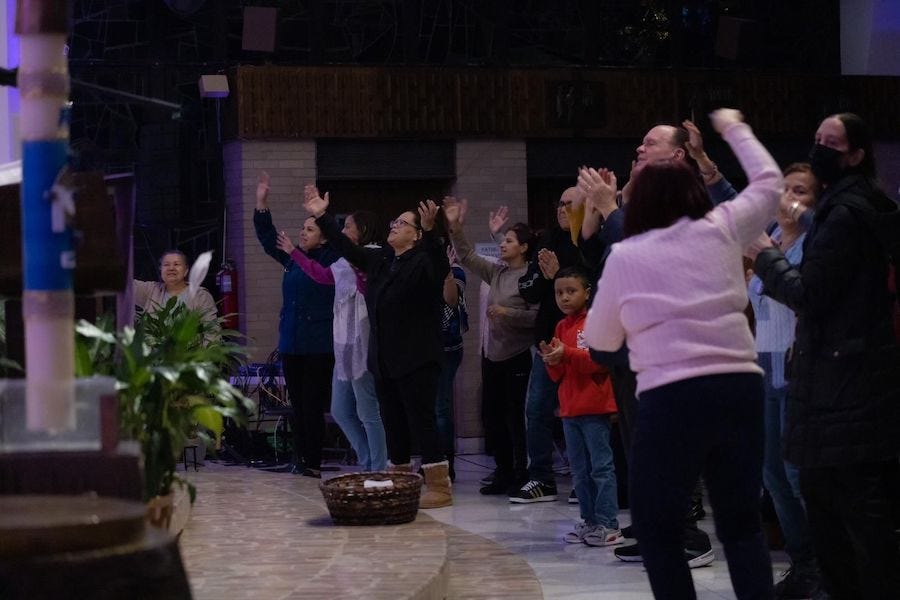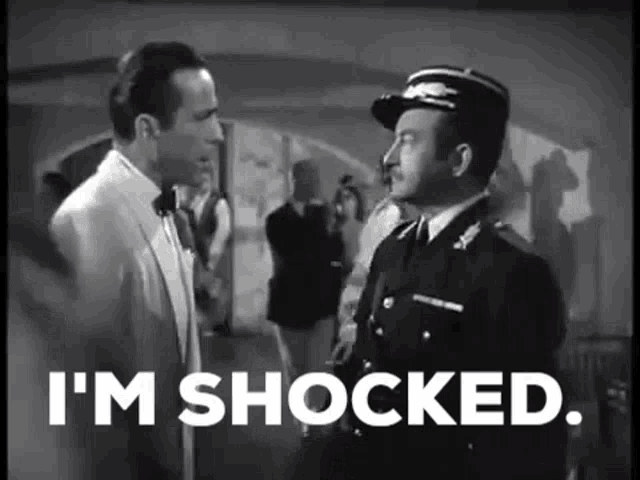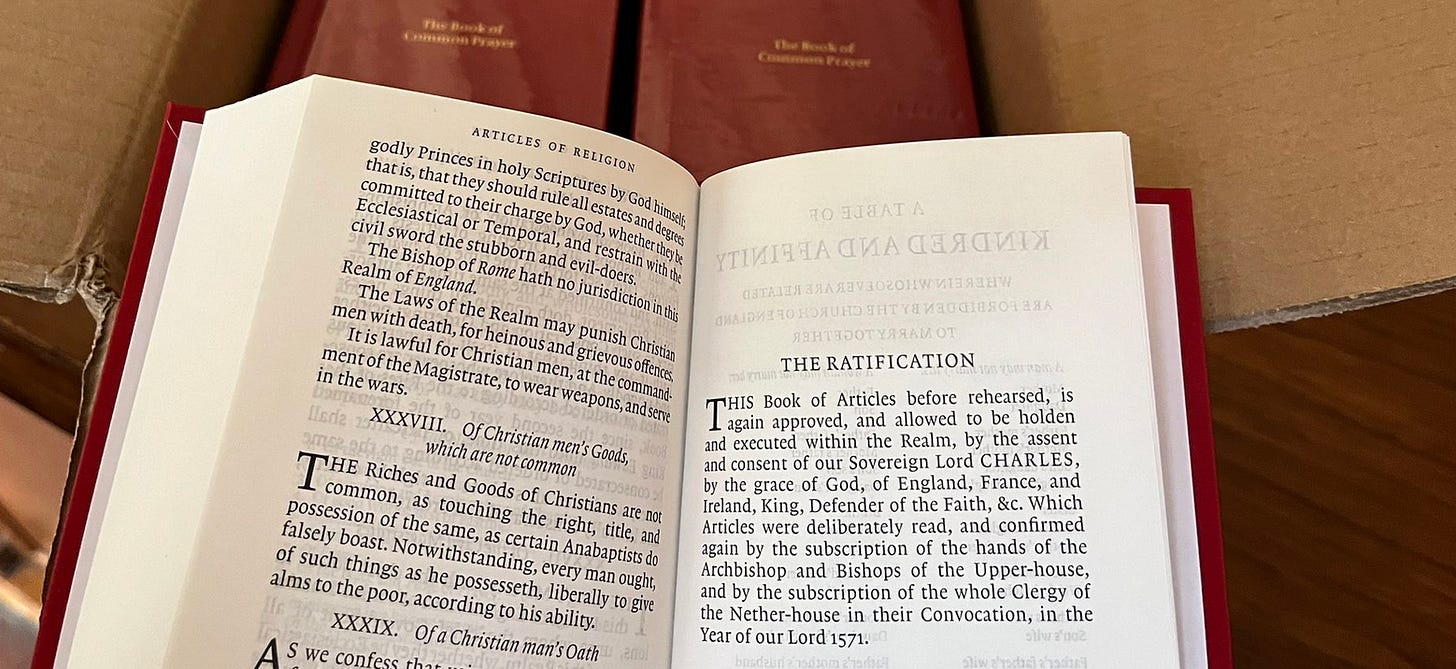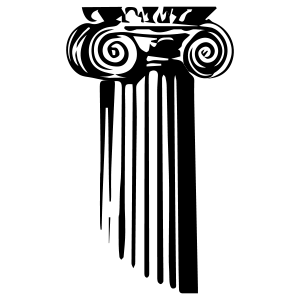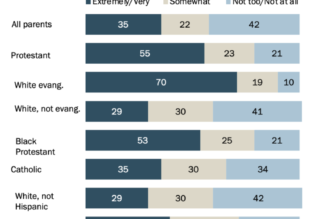Happy Friday friends,
Holy Week is nearly upon us.
When I was a young child, my extended family would often decamp to the campus of a well-known Midwestern Catholic university (I’m not giving away a free commercial here) for the duration of Easter.
The liturgies in the campus’ basilica were sufficiently high church, compared to our ordinary Chicago parish, that the majesty, if not the full catechetical import, of the season was impressed upon me from an early age, to the point that I understood that Holy Week was somehow much more important than Christmas, the lack of presents notwithstanding — lex orandi, etc.
Though I remember one year complaining volubly about the oppressive smell of the incense throughout Mass, much to my parents’ extreme embarrassment. It turns out that it wasn’t the incense my unformed nostrils objected to, but the liberal amount of perfume applied by the mortified young lady sitting next to us in the pew.
I also remember how, for the Gospel of Palm Sunday, the assembly would be the third voice for the proclamation, first hailing Christ’s triumphal procession into Jerusalem and then demanding his crucifixion days later.
As I child, I recall asking my father once why we were shouting to have Jesus killed, since, surely, we shouldn’t want that. My dad explained, as best anyone can to an eight-year-old, that Jesus hadn’t given the crowds what they were expecting and they didn’t understand who he was and what he came to do, and we could make the same mistake.
I certainly have.
On Palm Sunday, as the Gospel is proclaimed, I often find myself (when called upon) voicing my acclamation of Christ as Messiah, while channeling my interior Monty Python.
I have, indeed, followed a few messiahs in my time, and no doubt will again. While an earlier career mercifully inoculated me against looking to politicians for salvation, I still fall especially to the temptation of thinking I need to, or can be, my own savior, and that of my family.
Following Christ through the Holy Week narrative requires of me that I understand my own desire to do justice, to make everything right, to bring peace, to establish a kingdom on and of this world according to my own best lights — be that writ large across world affairs or small enough to fit in my own house.
The kingship of Christ is not of this world, but it is very much for it, and for me. Acclaiming his sovereignty means I need first to recognize I cannot be my own lord, or anyone else’s — and that whatever small services I may strive to offer, in work, at home, among friends, I don’t have the power to save anyone, especially myself.
I need the Messiah. Maranatha!
The News
At time of writing, Pope Francis remains in hospital following what the Vatican have described variously as “previously scheduled tests,” “difficulty breathing,” and an underlying “respiratory infection.” He is expected to be discharged later today or tomorrow morning.
Some have reported that the pope was actually rushed to hospital in an ambulance after a “pain in his chest” or a sudden “cardiac event.”
Still others have reported that “sources from the Gemelli hospital have leaked to the media that there is no cause for concern,” which I found deeply hilarious, despite the otherwise seriousness of the subject.
A lot of people have called to ask me what is really going on with the pope’s health and, honestly, I don’t know. It may be something serious, it may not be. But I am sure of two things:
1. We are unlikely to get honest announcements out of the Holy See press office, let alone real-time updates, on Francis’ health. The traditional way these things are handled (as in any monarchy, really) is through a series of announcements like:
“The pope is in perfect health.” “The pope is currently heli-skiing.” “The pope has a mild cold.” “The pope intends to complete an Ironman Triathlon next month.” “The pope died two weeks ago.”
2. It doesn’t really matter.
There is, of course, considerable interest in the health of the Holy Father and, in the absence of reliable information, rumor and speculation will abound. But, at least as I see it, the bottom line is this: Pope Francis is 86 years old, he’s missing part of a lung, he’s had some not unserious surgery in the past few years. We should be concerned about, and praying for, the pope’s good health as a baseline at this point.
No pope lives forever, of course. But Francis seems as likely to me to reach 90 as he does not to reach 87 — the current concerns notwithstanding. Feverishly obsessing over what we don’t know, and what no one is going to tell us with any certainty, doesn’t help the Church, or the pope, or anyone else.
So: Pope Francis is feeling unwell, he’s in the hospital, pray for him. And let’s hope they release some heli-skiing videos when he gets better.
—
Pillar reader Cardinal Arthur Roche has become the latest Vatican prefect to attempt to tell the bishops of Germany not to do something.
In a letter addressed to the German bishops’ conference president, Bishop Georg Bätzing, Roche displayed a newfound familiarity with the Code of Canon Law, pointing out to Bätzing that both lay preaching and lay ministers of baptism are recognized by the Church and provided for in the law, but only in certain circumstances — circumstances which do not seem to be present in Germany.
—
I don’t know if you have ever heard of the Archeparchy of Kottayam, the Knanaya people, or know what the practice of endogamy is. I hadn’t, and I didn’t.
The Knanaya trace their ethnic roots back to a group of Jewish Christians who, according to tradition, migrated from Mesopotamia to southern India in 345 A.D.
The Knanaya observe endogamy — the practice of strict intermarriage within the community to maintain membership.
To qualify as Knanaya, you have to have two Knanaya parents. And if you marry outside the community, you cannot pass membership to your children, and you lose your membership too.
This practice is now being challenged in a couple of different places, and how the Church recognizes and limits its recognition of the practice is fascinating.
—
The bishops of the Philippines issued a “clarification” last week, reminding local Catholics that they cannot — CANNOT — become Freemasons.
I know. Who could possibly be confused about that? It’s like a memo going out from an FBI field office reminding agents that their work is incompatible with moonlighting for the KGB. But it happened. In fact, it happens pretty regularly with bishops’ conferences around the world.
For reasons passing my understanding, Catholics around the world are constantly asking if Church teaching on Freemasonry has changed — and quite a lot of the time it’s the bishops who are doing the asking, as much as the laity. I think the reason for this might be that, while everyone knows the Church says Freemasonry is bad, not many people actually understand why.
And I will be honest with you, although this was in the news, we mostly wrote the explainer because people kept asking for it. This is, apparently, the content you guys want.
If you like that sort of thing, please consider subscribing.
—
There’s a revival going on in the Bronx.
If you don’t know much about such things, the word “revival” probably makes you think of stuff like speaking in tongues, prophetic “words”, intercessory prayer, and the kind of charismatic music that, honestly, I don’t really understand or have any experience of.
Well, in this case, you’d be right.
And it’s been going on, continuously, all Lent.
This is a truly interesting event, and this report served as a really helpful way in to an entire part of the Church’s ministry and life that I really didn’t know anything about.
The Institute of Catholic Culture is now enrolling new students in our upcoming free, online course: Sacred Liturgy: History & Principles of Christian Worship. Join us for a deep dive into the rich symbolism and meaning of the Mass, the Sacraments, sacrifice and worship, the liturgical calendar, and more!
‘Surprise’
This week, Fr. Hans Zollner, S.J., made waves across the Church when he resigned from the Pontifical Commission for the Protection of Minors.
Zollner, a founding member of the PCPM, has for the last several years served as the effective face of the Church’s efforts at reform following the clerical abuse crises of 2018-19.
The timing of his departure was striking, coming just days after Pope Francis reissued Vos estis lux mundi as permanent law, and following the resignation of Germany’s Bishop Franz-Josef Bode — who had previously refused to go, despite a damning report on his time in office and having tendentiously implied Zollner supported him. Both news items would, one would have thought, be occasions for Zollner to hail the PCPM’s work and effectiveness, but instead the priest quit.
In an initial announcement, the commission’s president, Cardinal Seán O’Malley, said Zollner had asked to step down because of too many claims on his time, and he was just too busy to continue in post.
But the priest’s resignation statement, which he published in several languages, made it clear he was utterly disillusioned with the PCPM, its structure, and governance, and indeed its work in general.
Zollner didn’t just step down from the PCPM, he said he wanted to “disassociate” himself from the whole project, and pointedly didn’t thank, or even acknowledge, Pope Francis in his statement.
As JD noted, Zollner has, for years, had to shoulder the internal stresses of trying to make a serious case for coherent reform, all while trying to firefight ugly cases like Bode’s and the handling of Fr. Marko Rupnik by his Jesuit confreres, and then being sent out to grin-and-bear-it for the cameras.
He’d clearly reached his limit, telling a crowd earlier this month that Vos estis is “not working” and is being applied inconsistently and without transparency.
Yet Zollner’s resignation statement still came as a surprise (apparently) to Cardinal O’Malley, who issued a follow-up to his own announcement, saying he was “surprised, disappointed and strongly disagree[s]” with the priest’s parting assessment of the PCPM.
Now, I’m not sure what exactly “surprised” Cardinal O’Malley. Assuming he was even a little bit aware of what Zollner was having to put up with behind the scenes, and not wholly disconnected from the dysfunctional reality Vos estis has been for bishops and Vatican officials alike, it seems most likely the cardinal was surprised at Zollner breaking the reformers’ omertà: that you don’t talk about problems, you only and always say things are going great.
If that’s the case, O’Malley’s reaction is itself surprising, since he, too, has broken the code in the past: The cardinal was once himself the public face of the PCPM and its efforts, but was widely seen as having been sidelined in favor of Zollner after publicly criticizing Francis’ initial response to the Chilean abuse crisis in 2019.
I suppose it’s also actually possible that O’Malley really was surprised, if Zollner really did quit with some tame excuses about his schedule before posting a blistering critique on social media. Or maybe Zollner’s letter of resignation somehow got held up in O’Malley’s office — as has happened before with PCPM correspondence.
But both seem unlikely to me.
Either way, Zollner has walked away with the one thing the PCPM and Vos estis lack in the eyes of many outside observers — credibility. As JD concluded in his analysis, the question is what, if any, soul searching Zollner’s departure will provoke among the Vatican brass.
And, as JD also concluded, soul-searching there also seems unlikely.
In the last week, in addition to O’Malley, Cardinals Kevin Farrell and Blase Cupich have both given fulsome testaments to how brilliantly the entire reforming process is going. Both those cardinals appear, at least to me, to see enthusiasm on the issue as a measure of personal loyalty to the pope, and prefer to rely on the power of positive thinking in the face of problems with transparency and accountability.
You can, and should, read JD’s whole analysis here.
For myself, I think Francis has shown himself a more willing reformer of structures than any pope in living memory. Making sure he is remembered as an effective reformer will require the good advice, and honest assessments, of men like Fr. Zollner — not dismissing those assessments as a disappointment.
—
Before we finish up, I would like you to please take a minute and pray for the repose of the soul of Luis Armando Torres, Jr.
Torres, who died yesterday, was an attorney, and a public servant in New York City. He was also an advocate for survivors of clerical sexual abuse.
In 2018, in the middle of the McCarrick scandal, as the bishops of the U.S. were at loggerheads with each other and the Vatican over what kind of new process to create in response, Torres addressed the USCCB in Baltimore about his own experience.
“The betrayal by my abuser is compounded by an ongoing betrayal realized by the Church every time it treats victims as liabilities,” Torres told them. “The dissonance that we all experience is impossible to resolve when the very people who encourage us to follow in the footsteps of Christ fail to follow his example.”
“The heart of the Church is broken, and you need to fix this, now.”
I was there. It was an incredibly powerful speech, delivered with total sincerity, and an obvious dignity, forged in years of pain. I would urge you to hear his words again, and to pray for him.
Thanks.
—
Vive le roi!
I’m convinced that one of the reasons – apart from America’s lingering superpower status – that our politics is followed so closely by foreign media is because our leaders are so often ridiculous. If you don’t have immediate skin in the game, another county’s leadership class can be a riotously good soap opera.
It is in this vein that I must profess myself a keen follower of the French president Emmanuel Macron, a man whose pomposity, accidental flair for the ridiculous, and all-round entertainment value is only heightened by the current unrest sweeping the Fifth Republic.
For those who have not been following, Paris is burning — brought to a standstill by mass protests, often with violent clashes between police and demonstrators, over le président’s attempts to reform the country’s retirement age and state pension program.
Despite pitching himself at the ballot box as something of a populist tribune of the people, Macron is, of course, the near platonic ideal of the French ruling class by education and career. He has also, since he was first elected, evidenced a marked taste for the trappings of imperial pomp and circumstance, delighting in ceremonial guards and state dinners in baroque palaces.
But while they will just about tolerant putting on airs in office, the French strongly dislike personal ostentation. So it was to my great amusement this week when I saw Macron come under fire for surreptitiously removing his watch halfway through a TV interview in which he lectured the public about the need for them to stop protesting, work harder, for longer, and take less in retirement.
His critics suggested Macron had removed the timepiece because he thought it might send the wrong message to wave a luxury item — which some estimated to be worth $80,000 — at the camera while preaching the virtues of austerity.
The Élysée Palace later insisted the watch was a $3k Bell & Ross, a brand at which I have tended to turn my nose up, and which should pay Macron a fortune for the product placement and instantly upping its snob appeal. Though the palace also conceded the watch had been customized with a personal coat of arms for Manu — which is très gauche.
While I find all this funny enough, I have some sympathy for Macron, too. Apparently he said he took the watch off not because he was embarrassed by his bling while scolding the hoi polloi about belt tightening, but because he kept banging it on the table and was afraid it was becoming a distraction.
And in his defense, wearing a Bell & Ross is actually dressing down by recent French presidential standards.
Former president and convicted criminal Nicolas Sarkozy was sporting a Patek Philippe Calatrava Perpetual Calendar (which will run you $60,000, second hand) while working a rope line in 2012. Halfway through glad-handing the crowd, Sarko decided he didn’t want to take any chances with the proles and slipped the watch into his pocket, just in case.
The French press had a field day with that one, too.
Watch or no watch, one does, however, need to be careful with criticizing the notoriously thin-skinned “Jupiter,” as the Parisian tabloids call the imperious Macron. Also this week, a woman in her 50s from the northern French town of Saint-Omer was formally charged by police with the crime of “insulting the president of the republic” and will stand trial. Liberté, égalité, fraternité.
She faces a fine of 12,000 euros if convicted for referring to Macron as “this piece of filth” in a Facebook post. Quel dommage.
But it isn’t just the press criticism or the restive populace giving Macron a tough week. He also faced the embarrassment of having to cancel a lavish state visit for King Charles III because of the strikes and riots paralyzing many French cities.
It was meant to be a grand occasion, full of historical significance.
As history buffs will know, the kings and queens of England (predating the act of union creating the UK) have long had claim to the French throne, dating back to Edward III in the 1300s. That claim received a surprising boost this week, thanks to a typo in the recently updated Anglican Book of Common Prayer.
As the king is head of the Church of England, the book is full of prayers for and references to the sovereign. So, following the death of Elizabeth II, someone needed to go through the text and replace hers with Charles’ name. Unfortunately, some editor decided he didn’t want to do the job the hard way and used “find/replace all” in the electronic files.
The result was that Charles III’s name was subbed into the original articles of ratification signed by Elizabeth I, along with all her titles, so the text now styles Charles as, well, King of France.
One hopes President Macron won’t take a typo too seriously.
And whenever Charles III’s visit is rescheduled, there’s a good chance he’ll be more popular than Macron when he arrives. That should be fun.
See you next week, and vive le roi!
Ed. Condon
Editor
The Pillar
The Institute of Catholic Culture is now enrolling new students in our upcoming free, online course: Sacred Liturgy: History & Principles of Christian Worship. Join us for a deep dive into the rich symbolism and meaning of the Mass, the Sacraments, sacrifice and worship, the liturgical calendar, and more!
Comments 14
Services Marketplace – Listings, Bookings & Reviews
